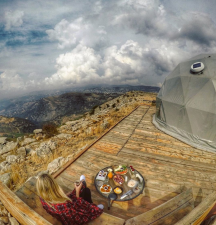 A new eco-village in Upper Egypt raises hopes that the country may move in a more sustainable tourism direction, which we would really love, but most indicators show that won’t happen any time soon.
A new eco-village in Upper Egypt raises hopes that the country may move in a more sustainable tourism direction, which we would really love, but most indicators show that won’t happen any time soon.
Hoda Baraka from Almasry Alyoum was one of the first journalists to point out how unregulated development is impacting on the timeless Siwa Oasis near Libya, and recently visited a new eco-village in Upper Egypt – an archaeologically-rich but neglected area south of Cairo. The New Hermopolis Eco Village founder and physician Mervat Nasser and architecture planner Yahia Shawkat both expressed hope during her visit that projects like this could benefit from the revolution – but only if government alters its mass tourism model. We are not so sure.
A revival of the unknown Upper Egypt
Just 211 miles south of Cairo, The New Hermopolis Eco-Village named after the Greek Messenger of the Gods Hermes aims to draw new awareness to the region’s intellectual history. Upper Egypt has suffered from two decades of deliberate repression by the Mubarak regime, following the rise of radical Islamic factions, according to Almasry Alyoum.
The village is comprised of 16 rooms made of limestone that can accommodate up to 52 visitors; revenue from the solar-powered venture will support development projects in the local community, which is situated very close to the Tuna al-Gebel antiquities.
Although Nasser is striving to create a framework that supports a new model of sustainable tourism, both she and Shawkat are realistic that the government has to get involved if this initiative has any hope of genuine success.
Government’s role in sustainable tourism
Shawkat told Baraka:
First, they [the government] must put in place the necessary regulations serving as guidelines for those wanting to undertake such initiatives. Consequently, they are responsible for ensuring that the tourism industry, once introduced in the region, does not grow at the expense of local communities.
Other substantial developments in the region also support a more eco-friendly approach to tourism, including the tranquil Desert Lodge in el-Qasr, suggesting that there exists a community-driven desire to move away from the model that carts bus loads of visitors to a select handful of increasingly ecologically-corrupted destinations.
But other indicators give us a less optimistic view of Egypt’s future.
The ugly side of reality
Tourism traffic alone the Sinai peninsula has seriously eroded the once-beautiful beaches and coral reefs, and wildlife has taken a serious beating. Thanks to efforts by Hurghada Environmental Protection and Conservation Agency (HEPCA), a dolphin sanctuary was recently established by the Red Sea Governorate, but a new report shows that since the revolution, failure to monitor illegal poaching has put Red Sea sharks sold for fins at risk of extinction.
Establishing the infrastructure for sustainable development and tourism takes time – a process we support wholeheartedly. But we worry that given the incredible financial losses that Egypt has already sustained in the last year, high-income projects will take precedence. Even so, the last year has proven that people are powerful. Faith in grassroots activism and action along with a healthy dose of perseverance will usher in a new Egypt.
image by Hoda Baraka
More on Eco-Tourism in Egypt:
Post-Revolution Development in Egypt Destroys Popular Red Sea Dive Spot
Romantic Desert Lodge in Egypt Offers Fresh Eggs and Sanity
PHOTOS: Green Prophet’s Whirlwind Tour of the Siwa Oasis



